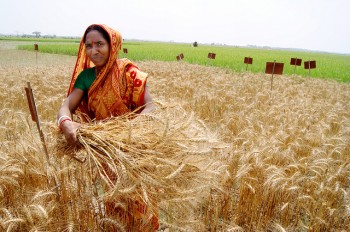Innovations
Working with smallholders to understand their needs and build on their knowledge, CIMMYT brings the right seeds and inputs to local markets, raises awareness of more productive cropping practices, and works to bring local mechanization and irrigation services based on conservation agriculture practices. CIMMYT helps scale up farmers’ own innovations, and embraces remote sensing, mobile phones and other information technology. These interventions are gender-inclusive, to ensure equitable impacts for all.
Agriculture ministers support policies to achieve Africa’s growth potential
 Innovations
Innovations
East and Southern African countries need to formulate and implement appropriate policies to help smallholder farmers access technologies.
Supporting sustainable and scalable changes in cereal systems in South Asia
 Climate adaptation and mitigation
Climate adaptation and mitigation
The rates of growth of staple crop yields in South Asia are insufficient to meet the projected demands in the region. With 40 percent of the world’s poor living in South Asia, the area composed of eastern India, Bangladesh and Nepal has the largest concentration of impoverished and food insecure people worldwide.
Global conference underscores complex socio-economic role of wheat
 Capacity development
Capacity development
A recent gathering of more than 600 scientists highlighted the complexity of wheat as a crop and emphasized the key role wheat research plays in ensuring global food security.
Green manure crop cover reduces need for mineral fertilizer in Africa
 Innovations
Innovations
Green manures are an affordable and environmentally friendly alternative to fertilizer for many farmers in southern Africa.
CGIAR open letter to the heads of state attending the 70th UN General Assembly
 Climate adaptation and mitigation
Climate adaptation and mitigation
Martin Kropff and John Snape joined leaders from CGIAR centers worldwide in an open letter to the heads of state at the 70th UN General Assembly in New York.
Replacing gender myths and assumptions with knowledge
 Gender equality, youth and social inclusion
Gender equality, youth and social inclusion
If we are to be truly successful in improving the lives of farmers and consumers in the developing world, we need to base our interventions on the best evidence available.
Value of CGIAR wheat estimated at up to $3.8 billion a year, research shows
 Innovations
Innovations
Wheat bred by the CGIAR consortium of agricultural researchers has a huge global reach.
